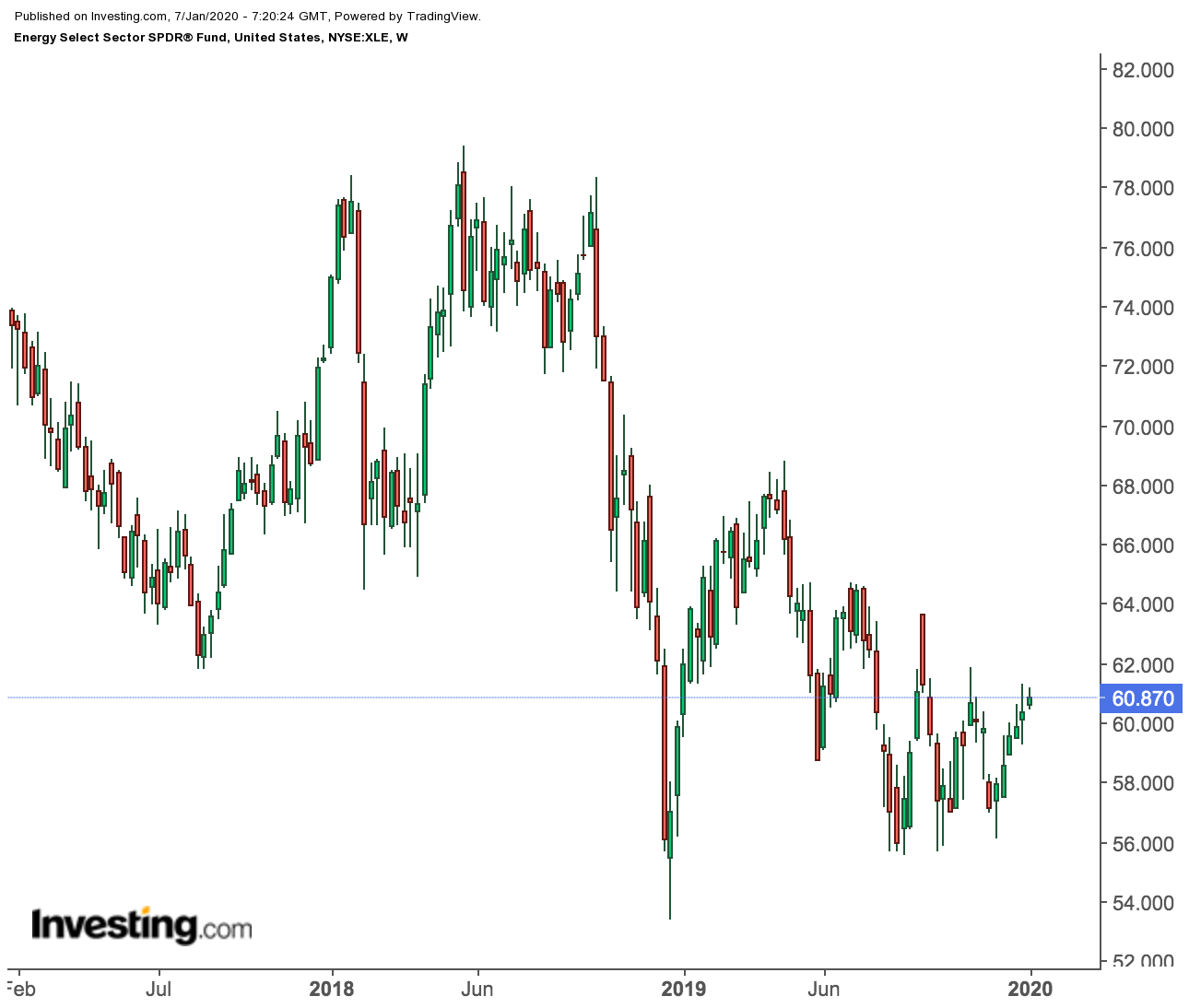As conflict between the U.S. and Iran, one of the world's top oil producers, remains a possibility, oil stocks are finally beginning to look attractive again. Oil prices spiked this week on fears that a serious rupture between the two powers will disrupt oil supplies from the Middle East, causing price inflation.
Oil extended its dramatic surge above $70 a barrel on Monday before paring some gains as the fallout after the U.S. assassination of one of the Islamic Republic’s most powerful generals continued. The U.S. State Department warned of a “heightened risk” of missile attacks near military bases and energy facilities in Saudi Arabia.
U.S. President Donald Trump repeated his threat of further attacks if Iran retaliated. Crude was last this high when Saudi production facilities were attacked in September, knocking out about 5% of global output.
As we have pointed out before, investing in a few large cap oil stocks should be a part of investors long-term strategy to benefit from scenarios like the one currently evolving. That strategy didn’t offer much appeal to investors last year when the large cap U.S. energy stocks underperformed the broader market.
The Energy Select Sector SPDR ETF (NYSE:XLE), which holds large-cap U.S. energy stocks, hardly budged during the past year, even as the S&P 500 surged more than 25%. But investing in oil stocks is a long-term bet.
For investors in oil stocks, the choice to make remains very simple irrespective of the recent surge in oil prices: buy stocks of companies that are showing good financial discipline, that have the ability to generate healthy cash flows in both good and bad times and that pay higher dividends.
This approach makes even more sense given the drastic change in the dynamics of energy markets. The Middle East, for example, is losing its status as the biggest oil producer. The shale revolution has made the U.S. the world’s biggest producer of oil and natural gas.
Oil Supply Disruptions
In 2019 the U.S. became a net exporter of crude for the first full month in at least 70 years. Production was at a record 12.9 million barrels per day at the end of November, more than Iraq, Iran, Kuwait and United Arab Emirates combined, according to Bloomberg.
If the current hostility worsens, there is a good possibility that oil might trade in a much higher range than that forecast by analysts last year. This would open up many short-term opportunities for investors to make money, especially in the drillers whose balance-sheets are in distress and who need prices to go much higher to break-even.
But we don’t find that short-term approach very appealing, especially because several top analysts are skeptical about a sustained rally in oil prices. The cost of black gold may fall in the coming weeks if there is no major supply disruption as a result of the U.S.-Iran conflict, analysts at Goldman Sachs said in a note, adding that there is limited evidence of an acceleration in global growth that could support higher prices.
In our view, buying dividend-paying integrated energy producers, such as Chevron Corp (NYSE:CVX), is a much better way to play oil strength. Chevron was the top performing Big Oil stock in 2019 after hiking its share buyback program 25% and dividend by 6%. CEO Mike Wirth is pursuing a strategy where he is unwilling to spend big and is instead focusing more on returning capital to investors. With an annual dividend yield of 4%, the producer pays $1.19 a share quarterly payout.
For those with a slightly higher appetite for taking risks and earning a dividend yield as high as 6%, Royal Dutch Shell (NYSE:RDSa) is your best bet. The energy giant has been leading the sector in shifting from oil into lower-carbon natural gas and electricity production. It’s also undertaking a $25-billion share buyback plan, which could keep its stock well-supported. The producer pays $0.42 a share quarterly payout.
The London-based BP (LON:BP) PLC (NYSE:BP) is another strong name when it comes to earning higher dividends. Its current yield is 6.45%, translating into a quarterly payout of $0.615 a share. That disbursement has risen just 5% since 2014, showing the cash constraints this oil giant has faced since then.
One of the main reasons BP remains cash-starved is the 2010 Deepwater Horizon oil spill in the Gulf of Mexico. The company is still paying for that disaster and will continue to do so for a few more years. But if oil prices continue to surge, the energy giant will be in a more robust cash position than previously forecast.
Bottom Line
Investing in reliable global energy stocks that offer higher yields and stable cash flows is a much better strategy than buying volatile oil stocks whose fate is closely tied with the short-term direction of oil markets.
